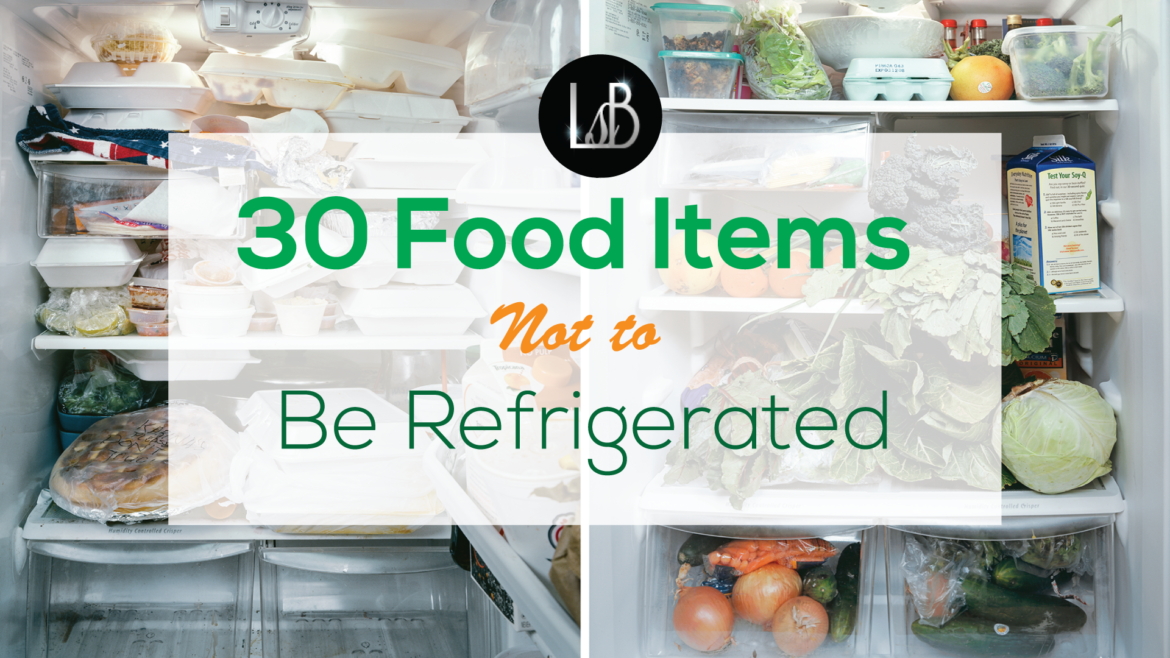Refrigerators have been keeping food cool at our home since 1913. It is evident that you need to refrigerate things to store them because you cannot go to market or grocery store 3 times a day. But is keeping things in refrigerator obvious? What if there are some foods that do not need the blast chilling! What if blast chilling is contributing to their deterioration! What if those foods just need a dark cold place but the moist environment in a fridge deters them! Here is a list of 30 items that need not to be put in a fridge to be stored.
-
Banana: Oh Na Na Na!
Bananas are awesome for a reason. Not just that they are capable of helping you out of midnight hunger issues, they can retain their nutrients right outside the fridge. Until they ripen, as in, until they turn black and squishy, you can let them stay out and add beauty to your fruit bowl. What can a fridge do to a banana? The cold and the dark atmosphere inside it will accelerate the ripening and might even push it to rot.
-
Potato: You are LOVE!
Potatoes should be stored in a dry place with dark environment around it. A fridge temperature can make the potato turn sugar into starch more than usual. It is for the best of the potato to remain outdoors. Not just that, potatoes should be removed from the plastic covers or paper covers. Keep them unwashed too!
-
Onions: Chop Me I’ll Make You Cry
Okay, it’s a love hate relation with onions, accepted! But a fridge can turn them into moist blobs of rubbery pink layers. Same as potatoes, onions should be taken off their covers and put in a well-ventilated box. As you are not going to peel them until you cook them, the unpeeled ones should have a constant supply of fresh oxygen.
-
Avocado: OMG! It’s pricy
Did you buy avocados that are not ripe yet? Better let them stay out of the fridge. Avocados need open places to ripe. A cold fridge might deter the process of ripening. Even if it is ripe, the only time you can store them in a fridge is when you might not use them right away.
-
Garlic: You Can’t Have Me Too Much
I am not kidding when I say this, garlic put in the fridge might actually help it sprout into a plant. The garlic itself skill gets rubbery and soggy. The what part is that the shape and color of the garlic will not change. Now it will become hard to tell if the garlic is undergoing any changes.
-
Bread: “A loaf of bread, a jug of wine, and thou”
Like the Other food items mentioned in the list bread also will perish in a refrigerator because the coldness will make the bread rot and still faster than normal. Only if you had already made sandwiches with the bread you are a loved to store it in the fridge. if not leave the bread right on the counter to have fresh crunchy and soft sandwiches throughout the day.
-
Coffee: Anytime is Good Time!
What do we all love coffee for? It’s flavor and electric freshness that knocks the slip out of the room. But putting coffee decoction or coffee beans might reduce the coffee flavor. There is one way that you can store coffee in a refrigerator. But only when you have made large amounts of coffee decoction that it can be store in airtight boxes or zip locks.
-
Tomatoes: You look marv’RED’llous
The zing that a ripe tomato adds to any dish is irreplaceable. This might just be a reason as to why you should not store tomatoes in a fridge. The coldness of a refrigerator will slow down the ripening process of a tomato leaving it inedible. The coldness will not only stop the ripening process it might Alter the texture of the tomato and also and I’m Breaking the inner membranes of the fruit wall which my do untold damage to the tomato internally.
-
Honey: You Missing Me?
Fun fact about Honey is that it is a naturally self-preserved food item. Even after this if u store honey in a fridge it might just reverse the very texture of honey making it rubbery like a dough. This is because refrigeration might induce the process of sugar crystallization in the honey. As long as Honey is stored in an airtight box it might as well sit on the table adding more value and beauty to it. You can use Honey to make various immunity boosting drinks at your home.
-
Melons: And Women Are Hard To Know
Researchers suggest that watermelon Street in the same number of antioxidants if they stay at room temperature. Furthermore storing melons in a refrigerator might cause a fall in their beta carotene content. You can surely store melons in a refrigerator if you had already cut them. But the cut melons should be well sealed by a duckling film or buy a tight zip lock.
-
Pumpkins: Hello, Gourd-geous!
Is Halloween around the corner? Then you must have started buying those weird shaped on pumpkins already. Since it is Halloween the best place to store pumpkins will be the scariest place of the entire house, the basement. Why? Because pumpkins require dark places with cold atmosphere to stay at an optimum level of ripeness.
-
Olive Oil: Everyday Italian
Are you waiting to Sauté some Green peppers in the rich olive oil? Now that might not be possible if you begin to refrigerate it. Olive oil should stick meters away from the fridge in a dark cool area if not it will turn its consistency To a Butter like density.
-
Basil: Herb That Heals
Basil can take a dish from level 1 to level 99 with a small alteration. But refrigeration can take basil from level 99 to level 1. Two reasons for this to happen is 1, the refrigeration will make Basil built a lot faster than usual, 2 Basil might absorb all the smells of other food in the fridge and spoil the fragrance or flavour of your food. If you need to refrigerate Basil then store it in a tight box in the refrigerator. Otherwise, treat basil like flowers. Let them sit in a bowl of water on the table.
-
Peanut Butter: And Lots Of Childhood Memories
Peanut butter and its velvety softness can bring colour to anyone’s Monday Blues morning. But refrigerating it might just be the reason you might never again eat peanut butter. Why you ask? The answer is simple. That soft peanut butter that spreads easily on to the bread will soon turn into sticky Rocky dough of peanuts covered in butter.
n jelly. However, unlike most jams, peanut butter should be kept out of the refrigerator. Placing it inside your fridge can eventually turn the PB hard and dry. Instead, keep the peanut butter in a cool, dark and dry place, such as your cupboard. This will keep the peanut butter smooth, soft and ready for spreading.
-
Pickle: What Else Is Life but A Couple Of Them In A Jar
If you ever put it in a refrigerator you are not an Indian. It is now time that I knock some sense. Pickles are called pickles for a reason. They are dipped and infused with self-preservative which will keep them going for the next decade even through the apocalypse. So you’re putting pickles in a refrigerator is just redundant.
-
Donuts: I love it!
Let me begin by saying, NO. NO DONUTS IN THE FRIDGE. But if you want them to turn sticky, soggy doughy or even stale, be my guest. The moist environment in the fridge will turn your donuts to little pieces of hell covered in sugar. The fact being, donuts are not to be stored, they need to be eaten right away. Do not store donuts for over a day.
-
Oil Or Vinegar-Based Salad: Thinking of Healthy Food?
It is capable of being okay for a long period of time without refrigeration. Moreover, refrigeration of salad dressings brings bad smell to them. Keep in mind that there are some salads that are mayo or yogurt based should be refrigerated in order to keep them fine. So, if you have some salad that has been already dressed, you can keep them away from your fridge without any hesitation.
-
Ketchup: Everybody Wants It
Having bacteria deterring acids is a boon for ketchup as you can expect to be okay with your ketchup up to more than years without refrigeration. The preservatives used in ketchup are very helpful in maintaining the quality of it for many days even after opening it. So, if you have already opened a ketchup bottle and tensed with its decaying, then you will not have to worry anymore.
-
Canned Tuna: Hmm Something Fishy
Many people keep their canned tuna in their refrigerator, but they should know that as long as the pack of the tuna fish is sealed, it is safe to keep it at room temperature without causing any damage. Canned tuna has a lot of preservatives which makes it completely fine to keep in the kitchen cupboard rather than in the fridge. Also, the taste is better at room temperature rather than having it completely cold.
-
Acidic Fruits: Keeps You Healthy Inside Out!
Chill damage is a common effect of cold temperature on the fruits filled up with citric acid like oranges or lemons. These citrus fruits need natural temperature for ripening, so keeping them inside the refrigerators hampers this process. You will also see some spots as well as dull skin on these types of fruits if kept in the refrigerators.
-
Cucumber: If I were a vegetable, I’d be a cute-cumber
Cucumber enjoys room temperature, so the fridge is not a suitable place for preserving it. You will often see damaged skin on cucumber after bringing out of the refrigerator. In fact, cool temperature speeds up the decaying of cucumber’s skin, so find a dry and cool place at room temperature for your cucumber and be worry-free with it for a few days.
-
Carrot: Do you know Buggs Bunny?
Like cucumber, the same thing can be applied for carrot. Refrigerating carrots can give you a shocking experience with rotted, water-filled carrots within a few days. However, carrots do need to be stored in darkness, away from sunlight. Keeping them in a place with high moisture will result in getting spoiled sooner.
-
Cereal: This is ‘Cerious’!
Never be tensed with your cereal as you do not have to put it in the refrigerator in order to keep them fresh. It can be okay without refrigeration. Again, the moisture in the fridge and the low temperature can spoil their texture and make cereal less crunchy.
-
Peppers: Which colour you prefer?
Peppers add colour to your food. Red yellow and green, not just colour but flavour to the food. They add the “Zing” element to your meal. But storing them in the fridge will dull its colours and mellow the flavours. Better to store them in a cool dry place. Another item to be added to this category is chills. Pepper is also included in immunity boosting food products.
-
Spice(s): Is Life!
Do you store your spices in a fridge? You should be either a north Indian or not an Indian at all. Because let me remind you, spices are plant products that can walk through the apocalypse. Remember how spices are stored in stores without any refrigeration? Then why should you? Let them lie in the pantry and relax.
-
Apple: One a day…
An apple a day keeps the doctor away, refrigeration for a day keeps the apple away! It’s true that apples oxidase very quickly when left out in the open. But this is so only when they are cut. But while ebbing uncut, it is not advised to store them cold. The enzymes in an apple work better and are active at room temperature. For almost 2 weeks, apples last outside. But after that, they begin to release a gas that ripens them and other fruits around them.
-
Fish & Soya Sauce: An Ounce of Sauce Covers A Multitude Of Sins
Fish sauce and soya sauce can stay up for an eternity. Their shelf life is almost 2-3 years. Soya sauce is already fermented, thus eliminating the need for refrigeration. So is fish sauce. But on the safer side, you can opt to put it in the fridge after year of using it. You can always leave the choice of pantry space and cold storage space.
-
Eggplant: You don’t steal a bitter one
It surely is a hermit. It requires a dark place away from the sunlight and has to be dry. Eggplant should be kept away from sunlight and at room temperature. When placed in those surroundings, it is likely to last much longer. Temperature 50F it might damage both the flavor and texture. Another important fact to remember is that eggplant has ethylene gas which is released for ripening. Thus, while storing eggplant, store it separately in a cling film.
-
Eggs: To Be Or Not To Be (Refrigerated)!
No one still knows if eggs should be put in refrigerators or not. But one thing is for sure. The eggs stored outside and the eggs stored within a refrigerator are not any different. The debate is still on but many people who store eggs outside the refrigerator watch for its edibility.
One study suggests that keeping eggs whether in a refrigerator or not does not change their normal properties, so it can be said that if you keep eggs at room temperature, there should not be any problem. There is another study that reveals that keeping eggs inside the refrigerators spoil the natural taste and flavour of eggs, so it is wise to keep eggs outside of your fridge.
In contrast to the above theory, as per www.eggsafety.org, in the USA, you need to keep eggs in the refrigerator, no its not a choice, It’s a Law. We will discuss this in detail later.
-
Vinegar: That’s What Fear Smells Like
Well, vinegar is indefinite. It will run through the judgment day and outlive all humans. There is no need to store vinegar in a fridge because vinegar itself is a preservative. White vinegar should not be forced into a fridge. But vinaigrettes, few versions of vinegar like herbs, shallots, garlic, and onion should be stored in a fridge.
There are many apart those above-listed ones which need not to be refrigerated for a life. Doesn’t your fridge look BIIIIG already? Go clean and make some space to stuff it again!




